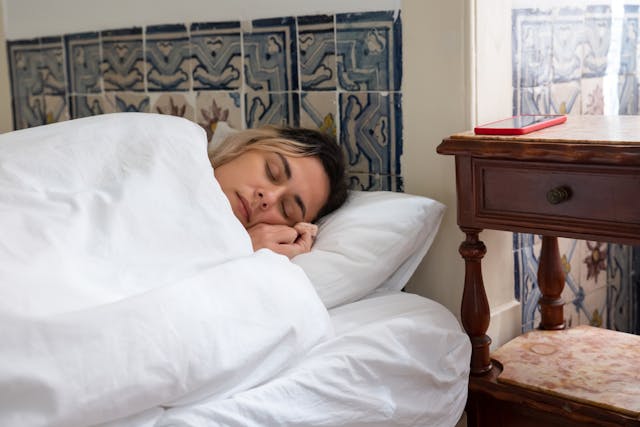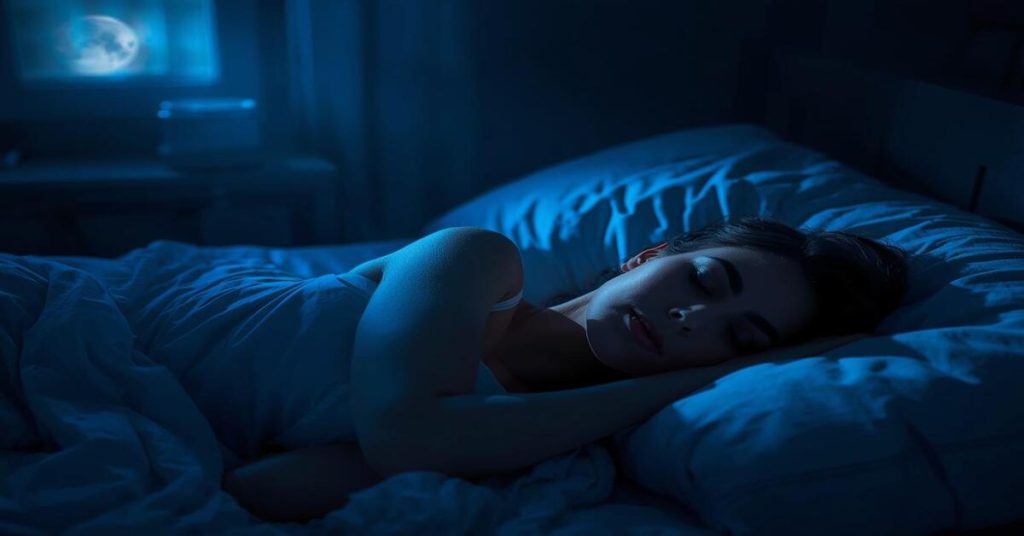Top 20 Deep Sleep Techniques for Mental Wellness 😴🧠

Sleep isn’t just about rest—it’s a powerful therapy for your brain 🧠 and soul. In today’s busy world, millions struggle with poor sleep and mental fog. But with the right deep sleep techniques, you can enjoy peaceful nights and sharp mornings. Let’s explore how to sleep deeply and wake up renewed—naturally and effectively.
1. Stick to a Consistent Sleep Schedule ⏰
Our bodies love routine. Going to bed and waking up at the same time every day—even on weekends—helps regulate your internal clock. This stability trains your brain to enter deep sleep more efficiently. Use a sleep-tracking app to monitor your progress.
2. Create a Calm Bedroom Environment 🛏️
Transform your bedroom into a peaceful sanctuary. Keep it dark, cool (around 18°C), and noise-free. Invest in blackout curtains, a white noise machine, or calming essential oils like lavender for a natural sleep boost.
3. Cut Down on Caffeine and Screens After Sunset 📱☕
Late-night coffee and screen time are enemies of deep sleep techniques. Blue light from phones and caffeine stimulate your brain, making it harder to fall asleep. Replace screen time with reading or gentle stretches before bed.
4. Try Guided Sleep Meditation or Breathing Exercises 🌬️🧘♀️
Deep breathing and guided meditation can lower stress hormones and signal your body to relax. Try the 4-7-8 breathing method or use apps like Calm and Insight Timer for soothing sleep sessions.
5. Eat a Sleep-Friendly Dinner 🍽️
Avoid heavy, spicy, or sugary meals at night. Instead, choose sleep-promoting foods like bananas, almonds, chamomile tea, and oatmeal. These foods contain magnesium and melatonin—the hormones of rest.
6. Limit Naps to 20 Minutes Only 😴
While short naps can be refreshing, longer naps during the day can disturb your nighttime cycle. If you need a nap, keep it under 20 minutes and avoid napping after 3 p.m.
7. Journaling to Clear the Mind 📓🖊️
Overthinking is a common cause of poor sleep. Journaling your worries or writing a gratitude list before bed can ease your mind. This helps you relax emotionally—an essential part of mental wellness and deep sleep.
8. Use Natural Supplements with Caution 🌿
Some people find melatonin, magnesium glycinate, or valerian root helpful for falling asleep faster. But always consult a doctor before starting any sleep supplements.
9. Avoid Overthinking Bedtime Routines 🧠
Don’t stress about not falling asleep. The more pressure you put on yourself, the harder it becomes. Focus on calming thoughts, visualize peaceful places, or repeat calming affirmations like, “I am safe. I am relaxed.”
10. Move Your Body During the Day 🏃♂️💪
Daily physical activity can improve your sleep quality. Just 30 minutes of walking or stretching can make a big difference. Avoid intense workouts right before bed though, as they may energize you instead of calming you down.
Read more: 🌙 Transform Your Mind & Sleep Naturally: 10+ Expert-Backed Tips for Mental Wellness & Deep Rest
11. Practice Progressive Muscle Relaxation 🧘♂️
This is one of the simplest deep sleep techniques that anyone can try. It involves tensing and then slowly relaxing each muscle group in your body—starting from your toes and moving upward. This reduces physical tension and prepares the mind for deep rest.
12. Keep a Cool Core Body Temperature ❄️
Taking a warm shower an hour before bed might seem counterintuitive, but it actually helps cool your core body temperature afterward—signaling your brain it’s time to sleep. A drop in core temperature is essential for entering deep sleep stages.
13. Limit Alcohol Consumption at Night 🍷🚫
Alcohol might make you feel sleepy, but it disrupts the deep sleep phase and REM cycle. One of the most misunderstood deep sleep techniques is avoiding alcohol before bed to ensure uninterrupted and restorative sleep.
14. Try Aromatherapy with Essential Oils 🌸
Scents like lavender, chamomile, and sandalwood promote calmness. Use an essential oil diffuser or apply diluted oil to your wrists and temples. Aromatherapy helps create a routine that your body associates with sleep, enhancing mental peace and relaxation.
15. Listen to Slow Brainwave Music or Nature Sounds 🎶🌧️
Delta-wave music and nature sounds (like ocean waves or rainfall) are known to promote deeper sleep states. These soundscapes encourage the brain to slow down and shift into the rhythm of deep rest. They’re powerful yet underrated deep sleep techniques.
16. Eliminate Light Pollution 🚫💡
Even tiny light sources, like LED indicators or streetlights, can affect your melatonin production. Cover or turn off all lights, or wear a high-quality sleep mask. Deep sleep thrives in darkness—it’s nature’s signal to the brain for restoration.
17. Create a “Wind-Down” Alarm ⏳
Just like a morning alarm, set a “wind-down alarm” 60–90 minutes before bedtime to start your calming routine. When it goes off, stop working, lower the lights, and enter relaxation mode. This mental shift supports smoother transitions into deep sleep techniques.
18. Sleep on a Comfortable Mattress and Pillow 🛏️
Old or unsupportive bedding can cause tossing and turning. Your mattress should support spinal alignment, and your pillow should keep your neck relaxed. Investing in comfort pays off in improved sleep depth and mental clarity the next day.
19. Avoid Heavy Conversations Before Bed 🗣️⚠️
Stressful or emotional discussions before bedtime can increase cortisol and adrenaline, which disrupt deep sleep. Instead, schedule such conversations for earlier in the day. Emotional calm is essential for mental wellness and uninterrupted rest.
20. Align Your Sleep Cycle with the Natural Light Cycle 🌅🌃
Sunlight exposure in the morning helps regulate your circadian rhythm. Open your curtains during the day, or spend 15 minutes outside in natural light. At night, dim the lights. This alignment is one of the most biologically supported deep sleep techniques.
Why Deep Sleep Matters for Mental Wellness 🧠❤️
Deep sleep is when your brain detoxes, your body heals, and your mood resets. Lack of quality sleep has been linked to anxiety, depression, and poor focus. Practicing these deep sleep techniques improves emotional balance, memory, and overall well-being.
How Sleep Affects Brain Function and Mental Resilience 🧠💤
Sleep is the ultimate mental detox. During deep sleep, the brain clears out toxins, repairs neurons, and resets emotional circuits. People who regularly practice deep sleep techniques often report better memory, faster learning, and emotional control. Without enough deep sleep, you may find yourself emotionally overwhelmed, forgetful, or irritable—no matter how healthy your diet or how productive your day seems.
The Role of Deep Sleep in Hormonal Balance 🧬
Your hormones rely on deep sleep to function optimally. Growth hormone, melatonin, cortisol, and insulin all follow circadian rhythms. Disrupted sleep throws them off balance, leading to anxiety, sugar cravings, weight gain, and burnout. Practicing consistent deep sleep techniques helps restore natural hormonal cycles and makes you feel like your best self.
Signs You’re Not Getting Enough Deep Sleep ⚠️
- Waking up feeling tired even after 7–8 hours of sleep
- Mood swings or persistent low mood
- Lack of motivation and focus
- Craving caffeine or sugar constantly
- Weakened immunity and frequent colds
If any of these sound familiar, it’s time to revisit your sleep hygiene. Simple deep sleep techniques can drastically improve how you feel and function during the day.
Read more: Top 20 Proven Sleep Mental Wellness Tips to Instantly Boost Your Mood, Energy & Focus 🌙
Deep Sleep vs. REM Sleep: What’s the Difference? 🤔
People often confuse deep sleep with REM (Rapid Eye Movement) sleep. Deep sleep is the phase where your body repairs itself—muscles grow, tissues heal, and your immune system recharges. REM sleep, on the other hand, is when your brain processes emotions and memories through dreams. Both are essential, but deep sleep is the foundation for physical and mental restoration.
The Impact of Chronic Sleep Deprivation on Mental Health 😓
Lack of deep sleep doesn’t just make you tired—it alters brain chemistry. Prolonged sleep deprivation has been linked to clinical depression, anxiety disorders, and even early cognitive decline. Practicing reliable deep sleep techniques daily can be as important as therapy or medication in maintaining mental health.
Why Sleep Is More Important Than Motivation 💤➡️💪
People often blame laziness or lack of discipline for poor productivity, when the real culprit is sleep deprivation. Without restful sleep, your brain can’t concentrate, your body won’t recover, and your emotional bandwidth crashes. One of the best-kept secrets among top performers is prioritizing deep sleep techniques as part of their mental strength routine.
Case Studies: People Who Transformed Their Lives Through Deep Sleep 😲📈
Emily, 32: A software developer from Austin, she suffered from insomnia and burnout. After following a strict sleep routine, reducing screen time, and using meditation techniques, her anxiety levels dropped within 3 weeks.
Javed, 41: A banker in Mumbai, he added aromatherapy and deep breathing to his sleep rituals. Within a month, he reported more energy and less brain fog.
Sandra, 55: She focused on nutrition, cutting sugar and caffeine at night, which significantly improved her deep sleep and reduced menopausal mood swings.
These examples show that incorporating deep sleep techniques isn’t just theory—it works.
Natural Sleep Boosters You Can Try Today 🌿☕
- Chamomile Tea: A mild sedative that promotes calmness before bed.
- Magnesium Supplements: Helps reduce anxiety and muscle tension.
- Bananas: High in magnesium and potassium—natural muscle relaxants.
- Almonds: Packed with sleep-friendly nutrients like zinc and tryptophan.
- Dark Chocolate (in moderation): Contains serotonin boosters—perfect when consumed a few hours before bed.
Remember, these are additions—not replacements—for consistent deep sleep techniques and sleep hygiene practices.
Combining Sleep with Other Wellness Habits 🧘♀️🍎🏃♂️
Sleep is the cornerstone, but your results magnify when you combine it with exercise, mindful eating, hydration, and emotional self-care. When you work out during the day, avoid junk food, and take mental breaks, your body responds with higher-quality sleep. The beauty of deep sleep techniques is that they are enhanced by an overall healthy lifestyle.
Creating Your Own Deep Sleep Routine 📝💤
No two people are the same. That’s why creating a personalized sleep plan works best. Start by identifying your worst sleep habits (e.g., late-night scrolling, heavy dinners, irregular schedules). Replace one habit at a time with healthier options. Track your progress with a sleep diary or mobile app. Within a few weeks, these deep sleep techniques will feel like second nature.
Encouraging Children and Teens to Build Sleep Habits 👨👩👧
With rising screen time and academic pressure, many young people are sleep-deprived. Help them understand the importance of sleep by setting family routines—like no screens after 9 p.m., calming evening rituals, and maintaining consistent bedtimes. Teaching deep sleep techniques early ensures they grow up mentally and emotionally resilient.
Read more: “Top 42 Natural Tips to Sleep Better at Night and Boost Mental Wellness 😴🧠”
How to Reset Your Sleep Cycle Naturally 🌙🔁
If your sleep pattern is completely off, do a full “circadian reset.” Wake up early (even if tired), get bright sunlight, stay active during the day, and avoid naps. Go to bed at the same time each night—even if you don’t fall asleep immediately. This helps your body rediscover its natural rhythm. The power of deep sleep techniques lies in repetition and patience.
How Technology is Affecting Our Sleep 😵💻
We live in a digital world, and that has both pros and cons. While technology has made life easier, it has also severely impacted our sleep quality. The constant notifications, screen exposure, and social media scrolling overstimulate our brains and keep them in a state of alertness—even at night. If you’re serious about following effective deep sleep techniques, reducing screen time should be your priority. Experts recommend turning off all electronic devices at least one hour before bed to allow your brain to slow down naturally.
Understanding Sleep Cycles: Light vs. Deep vs. REM ⏳
Your sleep consists of different stages—light sleep, deep sleep, and REM sleep. Light sleep helps you transition from wakefulness, deep sleep repairs your body, and REM is where dreams and memory consolidation occur. However, most people stay stuck in light sleep due to stress, poor habits, or environmental disruptions. By applying proven deep sleep techniques, you encourage your body to enter and stay longer in restorative deep sleep stages.
Sleep Deprivation in Modern Society: A Hidden Epidemic 🌍
Millions of people worldwide suffer from chronic sleep deprivation, yet very few recognize it as a serious health issue. Sleep isn’t just a biological need—it’s a foundation for your brain and emotional wellbeing. Poor sleep has been linked to increased risk of depression, dementia, diabetes, and even heart disease. This is why practicing deep sleep techniques regularly isn’t a luxury—it’s a medical necessity. Just as you care for your diet or exercise, prioritizing sleep is essential for long-term vitality.
Environmental Sleep Triggers You Didn’t Know About 🌿🕯️
Small environmental cues can trigger your body into sleep mode—without you even realizing it. For example, a certain smell like lavender, a familiar sleep sound, or the dimming of lights can act as psychological signals. These subconscious triggers form associations in the brain that reinforce healthy sleep habits. This is why it’s helpful to build a routine of repeated deep sleep techniques—because your body starts linking specific activities with rest and relaxation.
Nighttime Anxiety: A Silent Sleep Killer 😣🌙
Have you ever felt calm during the day but anxious as soon as you lie down? You’re not alone. Nighttime anxiety is a common issue where your brain begins overthinking once external distractions are gone. Journaling before bed, using calming affirmations, and guided breathing are powerful deep sleep techniques to combat this. The goal is to train your mind to feel safe and secure during bedtime, so that sleep can come naturally.
Deep Sleep & Emotional Recovery: The Brain’s Reset Button 🔄
While you’re sleeping deeply, your brain sorts and processes emotional events from the day. Think of it like a cleanup crew sweeping your thoughts, storing useful memories, and discarding the unnecessary ones. Without this nightly reset, emotions like fear, anger, or sadness can pile up. That’s why people often feel emotionally refreshed after a good night’s sleep. Among all the deep sleep techniques, emotional recovery is one of the least discussed—but most vital—benefits.
How Poor Sleep Affects Relationships 💔😴
Did you know lack of sleep can make you more irritable, impatient, or even hostile toward loved ones? When you’re running on low energy, your emotional bandwidth shrinks. This affects communication, empathy, and connection. Couples who prioritize sleep often report fewer arguments and deeper emotional bonds. Practicing deep sleep techniques not only benefits you—it supports your relationships, too.
Morning Energy is Built at Night 🌞➡️🌙
The secret to waking up refreshed isn’t about your alarm tone or morning coffee—it starts the night before. The deeper your sleep, the more efficient your body becomes at producing energy. Sleep boosts ATP (cellular energy), balances hormones, and resets your nervous system. If you’ve been waking up tired despite 8 hours in bed, try focusing on better deep sleep techniques rather than just increasing time in bed.
Social Jetlag: The Weekend Sleep Trap ⏰📉
Do you stay up late on weekends and sleep in till noon? That might feel good temporarily, but it can disrupt your internal body clock—causing something called “social jetlag.” It’s like flying across time zones without leaving home. One of the most effective deep sleep techniques is maintaining the same sleep and wake times every day—even on weekends. This small discipline can create massive improvements in your sleep quality and mental wellness.
Read more: How Sleep Affects Mental Health: The Powerful Link You Must Know 🧠🌙
Sleep as a Spiritual Practice 🧘♂️🌌
In many ancient traditions, sleep is seen not only as rest but as a spiritual reset—a sacred time when the soul returns to its source. Treating your bedtime like a ritual—with gratitude, silence, and intention—can deepen your relationship with rest. Turning off distractions, lighting a candle, offering a silent prayer, or meditating can elevate sleep beyond biology into something healing and meaningful. These spiritual-style deep sleep techniques can offer peace not just for the body, but for the soul as well.
Final Thoughts 🌙

Good sleep isn’t a luxury—it’s a necessity for a happy mind. By consistently following these deep sleep techniques, you’ll unlock the secret to mental clarity, emotional resilience, and physical vitality. Start small, stay consistent, and let your body do its natural magic while you rest. 😴✨
For more expert guidance, check out Tips for Creating a Healthy Sleep Environment from Sleep Foundation.
Learn more about How Deep Sleep Benefits the Brain and Body on Healthline.



Pingback: Top 10 Best Foods for Better Sleep That Boost Rest Tonight 🌙